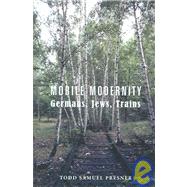Mobile Modernity
, by Presner, Todd Samuel- ISBN: 9780231140126 | 0231140126
- Cover: Hardcover
- Copyright: 3/15/2007
Though the history of the German railway system is often associated with the transportation of Jews to labor and death camps, Todd Presner looks instead to the completion of the first German railway lines and their role in remapping the cultural geography and intellectual history of Germany's Jews.Treating the German railway as both an iconic symbol of modernity and a crucial social, technological, and political force, Presner advances a groundbreaking interpretation of the ways in which mobility is inextricably linked to German and Jewish visions of modernity. Moving beyond the tired model of a failed German-Jewish dialogue, Presner emphasizes the mutual entanglement of the very categories of German and Jewish and the many sites of contact and exchange that occurred between German and Jewish thinkers.Turning to philosophy, literature, and the history of technology, and drawing on transnational cultural and diaspora studies, Presner charts the influence of increased mobility on interactions between Germans and Jews. He considers such major figures as Kafka, Heidegger, Arendt, Freud, Sebald, Hegel, and Heine, reading poetry next to philosophy, architecture next to literature, and railway maps next to cultural history.Rather than a conventional, linear history that culminates in the tragedy of the Holocaust, Presner produces a cultural mapping that articulates a much more complex story of the hopes and catastrophes of mobile modernity. By focusing on the spaces of encounter emblematically represented by the overdetermined triangulation of Germans, Jews, and trains, he introduces a new genealogy for the study of European and German-Jewish modernity.







